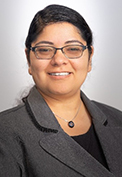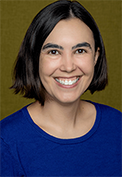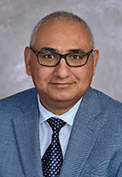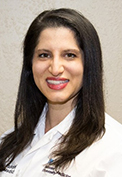The Arizona Academic Family Medicine Innovation Conference (AAFMIC) is a premier gathering of medical professionals, educators, researchers and students dedicated to advancing family medicine through research, collaboration and innovation. This full-day event provides a unique platform to engage in keynote discussions, oral presentations, panel discussions and networking opportunities with leaders in the field.
Schedule
- 8:00 to 10:00 a.m. – Registration and poster set up.
- 9:00 to 10:00 a.m. – Breakfast and networking.
- 10:00 to 10:30 a.m. – AAFMIC welcome remarks with Sharry Veres, MD, Kristen Rundell, MD, and Ed Paul, MD.
- Introductions by Leah Hillier, MD.
- 10:30 to 11:30 a.m. – Keynote presentation: A Research Journey: Story-Telling to Drive Healthcare Change.
- Presented by Nancy Pandhi, MD, MPH, PhD.
- 11:30 a.m. to 12:00 p.m. – Poster viewing and coffee break.
- Posters will be located in the pre-conference space.
- 12:00 to 12:45 p.m. – Awards luncheon: The Arizona Academy of Family Physicians Resident Awards.
- Hosted by Christy Boring.
- 12:45 to 1:00 p.m. – AzAFP Focus Magazine update with Edward Schwager, MD.
- 1:00 to 1:15 p.m. – Poster viewing and coffee break.
- 1:15 to 2:00 p.m. – Oral presentations by Bella Ayala, Creighton University of Medicine, Ashley Ha, A.T. Still University, Rabab Raja, Onvida Health, and Matthew Moran, Dignity Health Medical Group Family Medicine – Gilbert.
- Introductions by Karen Lutrick, PhD.
- 2:00 to 3:00 p.m. – Panel discussion: Making Scholarship a Part of Your Family Medicine Career.
- Panelists: Abdul Waheed, MD, MS PHS, CPE, FAAFP, Sarah Coles, MD, FAAFP, Freya Spielberg, MD, MPH, and Sommer Aldulaimi MD, FAAFP.
- 3:00 to 5:30 p.m. – AzAFP Arizona Family Medicine Residency Fair Reception.
- All medical students are welcome.
Keynote Speaker
 Nancy Pandhi, MD, MPH, PhD, is a physician-scientist whose primary focus is improving the delivery of primary care to vulnerable populations through patient-centered engagement approaches that are implemented at both the individual and organizational level. She is the national training director for the Health Experiences Research Network, which conducts research and develops public-facing dissemination products according to the international DIPEx methodology. She leads the Clinical Translational Sciences Award at the University of New Mexico, which has partnered with the University of Arizona to apply for funding together as a new Southwest Center for Advancing Clinical and Translational Innovation (SW CACTI). She is co-leading the recently NIH-funded Primary Care-Building Research Integration in Diverse Geographic Environments initiative, also in collaboration with University of Arizona. And she is assistant vice president of Research for Clinical Translational Research, associate chair for the Department of Family and Community Medicine and a practicing family physician.
Nancy Pandhi, MD, MPH, PhD, is a physician-scientist whose primary focus is improving the delivery of primary care to vulnerable populations through patient-centered engagement approaches that are implemented at both the individual and organizational level. She is the national training director for the Health Experiences Research Network, which conducts research and develops public-facing dissemination products according to the international DIPEx methodology. She leads the Clinical Translational Sciences Award at the University of New Mexico, which has partnered with the University of Arizona to apply for funding together as a new Southwest Center for Advancing Clinical and Translational Innovation (SW CACTI). She is co-leading the recently NIH-funded Primary Care-Building Research Integration in Diverse Geographic Environments initiative, also in collaboration with University of Arizona. And she is assistant vice president of Research for Clinical Translational Research, associate chair for the Department of Family and Community Medicine and a practicing family physician.
AAFMIC Panelists
 Sarah Coles, MD, FAAFP, is the program director for the Family and Community Medicine Residency at North Country Healthcare, a teaching health center in Flagstaff, AZ. She is also an associate professor in the Department of Family, Community and Preventive Medicine at the University of Arizona College of Medicine – Phoenix. She is practicing as a board-certified family physician. She obtained her medical degree from the U of A College of Medicine – Phoenix and completed her residency at Banner – University Medical Center Phoenix Family Medicine Residency. In addition to full spectrum primary care, Dr. Coles has expertise in evidence-based medicine, integrated behavioral health care, science communication and population health. She is actively involved advancing primary care through community engagement, institutional collaboration, governmental engagement and advocacy, and leadership.
Sarah Coles, MD, FAAFP, is the program director for the Family and Community Medicine Residency at North Country Healthcare, a teaching health center in Flagstaff, AZ. She is also an associate professor in the Department of Family, Community and Preventive Medicine at the University of Arizona College of Medicine – Phoenix. She is practicing as a board-certified family physician. She obtained her medical degree from the U of A College of Medicine – Phoenix and completed her residency at Banner – University Medical Center Phoenix Family Medicine Residency. In addition to full spectrum primary care, Dr. Coles has expertise in evidence-based medicine, integrated behavioral health care, science communication and population health. She is actively involved advancing primary care through community engagement, institutional collaboration, governmental engagement and advocacy, and leadership.
 Abdul Waheed, MD, MS PHS, CPE, FAAFP, is a certified physician executive (CPE) by the Certifying Commission on Medical Management (CCMM), strategic and tactical health care leader, and a fellow at the Institute of Health Care Improvement (IHI). He has been serving as the academic chairman for the department of Family Medicine for Dignity Health in Arizona since January 2024. In this role, he leads a clinical and academic enterprise with close to 50 faculty, advanced practice providers, residents in five ambulatory locations throughout the Central and East Valley — including a residency a program. He is a tenured professor of Family Medicine at the Creighton University School of Medicine and was recently named the interim designated institutional official (DIO) for Dignity Health East Valley Graduate Medical Education with ACGME accredited programs in Family Medicine, Internal Medicine, General Surgery, Emergency Medicine, and Obstetrics and Gynecology.
Abdul Waheed, MD, MS PHS, CPE, FAAFP, is a certified physician executive (CPE) by the Certifying Commission on Medical Management (CCMM), strategic and tactical health care leader, and a fellow at the Institute of Health Care Improvement (IHI). He has been serving as the academic chairman for the department of Family Medicine for Dignity Health in Arizona since January 2024. In this role, he leads a clinical and academic enterprise with close to 50 faculty, advanced practice providers, residents in five ambulatory locations throughout the Central and East Valley — including a residency a program. He is a tenured professor of Family Medicine at the Creighton University School of Medicine and was recently named the interim designated institutional official (DIO) for Dignity Health East Valley Graduate Medical Education with ACGME accredited programs in Family Medicine, Internal Medicine, General Surgery, Emergency Medicine, and Obstetrics and Gynecology.
Before moving to Arizona, he served as residency program director at WellSpan Health, where he led his program through ACGME accreditation. He also served as faculty of Family and Community Medicine at Pennsylvania State University College of Medicine and Philadelphia College of Osteopathic Medicine. He served in different academic and faculty roles from 2012 to 2024 and was ultimately promoted to clinical professor rank.
Dr. Waheed has a passion for building a culture of scholarship in academic programs. He has published outcomes of his scholarly activity programs at Penn State University College of Medicine and WellSpan Health in high impact journals. Most notably, it includes a 13-step structured roadmap to scholarly activity in a GME program and alignment of scholarly activity with the institutional priorities using RE-AIM and other implementation science frameworks.
Throughout his career, Dr. Waheed has been accolated with awards at regional and national levels — including Faculty Teacher of the Year by residents at Pennsylvania State University College of Medicine, Exceptional Teacher and Role Model by the medical students from Pennsylvania University College of Medicine, Scholarship in Education (SiE) Award by OSLER office at Pennsylvania State University 2015, Exemplary Teacher Career Award by Pennsylvania Academy of Family Physicians 2020, Program Director Recognition Award by the AFMRD 2021 and 2024.
Dr. Waheed has been on the Best Doctors America® list since 2012. He has also been awarded as “Hershey Hero” by patients for his clinical care. He was added to Dean’s Honor list at the Pennsylvania State College of Medicine in 2017 for best patient experience for hospitalized patients nationally. Dr. Waheed’s work directly and through his research mentees has also won several regional awards including: the prestigious Mark A. Conley Award for best research by Pennsylvania Academy of Family Physicians (PAFP) — 2021, 2022, 2023 — Best posters in category for several years consecutively, Best plenary at the WellSpan Discovery Day — 2021, 2022, 2023 — and Best Manuscript Award at the WellSpan Discovery Day — 2019, 2020, 2021, 2022, 2023.
 Freya Spielberg MD MPH is the vice chair of Research in the Department of Family and Community Medicine at the College of Medicine – Phoenix. Dr. Spielberg received her MD from the Weill Cornell Medical College, and completed her residency in family medicine at the University of Washington/Swedish Downtown Family Medicine. She completed a Robert Wood Johnson Clinical Scholars Fellowship and her master’s in public health at the University of Washington. Since her training, she has conducted research to decrease health disparities in the US, India, Bangladesh, Thailand, Botswana and Congo. Before joining the College of Medicine – Phoenix, she held leadership positions as faculty at the University of Washington, George Washington University, Stanford and University of Texas in Austin. Her focus over the past 20 years has been to develop and evaluate new technologies and community-based models of care to improve health outcomes, improve patient experience, improve provider experience, lower health care costs and diminish health disparities. In her new position at the College of Medicine – Phoenix, Dr. Spielberg is focusing on developing a SW Practice Based Research Network, providing research mentorship, developing multidisciplinary collaborations to reduce heat-related deaths and implementing new models of care for suicide prevention.
Freya Spielberg MD MPH is the vice chair of Research in the Department of Family and Community Medicine at the College of Medicine – Phoenix. Dr. Spielberg received her MD from the Weill Cornell Medical College, and completed her residency in family medicine at the University of Washington/Swedish Downtown Family Medicine. She completed a Robert Wood Johnson Clinical Scholars Fellowship and her master’s in public health at the University of Washington. Since her training, she has conducted research to decrease health disparities in the US, India, Bangladesh, Thailand, Botswana and Congo. Before joining the College of Medicine – Phoenix, she held leadership positions as faculty at the University of Washington, George Washington University, Stanford and University of Texas in Austin. Her focus over the past 20 years has been to develop and evaluate new technologies and community-based models of care to improve health outcomes, improve patient experience, improve provider experience, lower health care costs and diminish health disparities. In her new position at the College of Medicine – Phoenix, Dr. Spielberg is focusing on developing a SW Practice Based Research Network, providing research mentorship, developing multidisciplinary collaborations to reduce heat-related deaths and implementing new models of care for suicide prevention.
 Sommer Aldulaimi MD, FAAFP is the child of immigrants from the middle east. She grew up in Tucson and completed her undergraduate degree, medical degree and residency at the University of Arizona. During residency, she created and implemented a global health track at her program, working with mentors and residents to develop a robust curriculum. Dr. Aldulaimi was one of the first graduates of this track, and it has recently been recognized as an example for other programs nationally. After residency, Dr. Aldulaimi joined the faculty of the Department of Family and Community Medicine. She has a special interest in global health, teaching and caring for underserved populations. Dr. Aldulaimi currently serves at the co-director of Global Health Programs in the Office of Global and Border Health for the College of Medicine – Tucson; as the medical director for the Tucson Family Advocacy Program (medical-legal partnership); as director of Rural Health for the Family Medicine Residency Program; and she coordinates the refugee program for the department.
Sommer Aldulaimi MD, FAAFP is the child of immigrants from the middle east. She grew up in Tucson and completed her undergraduate degree, medical degree and residency at the University of Arizona. During residency, she created and implemented a global health track at her program, working with mentors and residents to develop a robust curriculum. Dr. Aldulaimi was one of the first graduates of this track, and it has recently been recognized as an example for other programs nationally. After residency, Dr. Aldulaimi joined the faculty of the Department of Family and Community Medicine. She has a special interest in global health, teaching and caring for underserved populations. Dr. Aldulaimi currently serves at the co-director of Global Health Programs in the Office of Global and Border Health for the College of Medicine – Tucson; as the medical director for the Tucson Family Advocacy Program (medical-legal partnership); as director of Rural Health for the Family Medicine Residency Program; and she coordinates the refugee program for the department.
Clinically, Dr. Aldulaimi is a full-spectrum family physician practicing inpatient medicine, obstetrics — including deliveries and care of newborns — caring for complex refugees in the outpatient setting and performing new refugee screening exams. She has continued to be active in global health since medical school and has experience working in Mexico, Guatemala, Honduras, Ecuador, Tanzania, Myanmar and Bangladesh. She also has brought education programs to some of these countries — including a neonatal resuscitation program in Tanzania and Basic Obstetrical Life support in Bangladesh. Her clinical and educational work domestically focuses on care of refugees, border health and other underserved populations.
Nationally, she is on the American Academy of Family Physicians Center for Global Health Initiatives Advisory Board, as well as the American Academy of Pediatrics Global Neonatal Advisory Committee as a content expert. She also served as the chair for the Society for Family Medicine's Global Health Educators Collaborative in the past.
|
|
Oral Presentations |
|---|---|
|
|
Creighton School of Medicine |
|
|
A.T. Still University; School of Osteopathic Medicine, Arizona Conclusion: Extragonadal endometriosis is a rare condition with atypical presentations. High suspicion is needed in reproductive-age women with acute right lower quadrant pain for early diagnosis and management. |
|
|
Onvida Health Rabbit syndrome (RS) is a rare extrapyramidal movement disorder characterized by rhythmic perioral tremors. It is most commonly associated with long-term antipsychotic use or abrupt discontinuation, highlighting the need for careful monitoring and management. We present the case of a 49-year-old female with a history of ADHD, panic attacks, anxiety, and depression who developed RS following the discontinuation of aripiprazole (Abilify). Despite being on escitalopram (Lexapro) 20 mg daily and aripiprazole 15 mg HS for four years, she continued to experience persistent depressive symptoms, including low mood, anhedonia, distressing thoughts, irritability, low energy, appetite fluctuations, and sleep disturbances. Due to a lack of clear indication for aripiprazole and emerging side effects—including periodic limb movements and metabolic changes—a gradual taper was initiated. The dose was reduced to 5 mg HS, and one month later, aripiprazole was discontinued altogether. Three months post-discontinuation, the patient developed involuntary perioral movements, which caused significant distress and sleep disturbances. She was diagnosed with RS and treated with benztropine (Cogentin) 1 mg BID, resulting in a 70% improvement in symptoms within one month. Although the risk of RS is lower with second-generation antipsychotics (SGAs) compared to first-generation agents, published cases remain limited to just eleven reports. Current management strategies include gradual tapering, switching to alternative antipsychotics, and the use of anticholinergic agents, with some evidence supporting β-blockers for symptomatic relief. Crucially, differentiating RS from tardive dyskinesia (TD) is essential to ensure appropriate treatment. |
|
|
Dignity Health Medical Group Family Medicine – Gilbert |
Presenters and Poster Abstracts
On behalf of the Arizona Academic Family Medicine Innovation Conference, we sincerely thank you for your time, expertise, and invaluable contributions as a reviewer for our research poster presentations. Your thoughtful feedback and active engagement were instrumental in fostering meaningful discussions and elevating the quality of the research presented.
We deeply appreciate your dedication to mentoring and supporting researchers and health professionals.
Once again, thank you for your generosity and commitment to advancing scholarship and innovation. We look forward to the opportunity to collaborate with you again in the future. You can download the Digital Abstract of the Poster Presentations (PDF).
Residency Fair Attendees
- Abrazo Central Family Medicine Residency – Carl Bryce, MD, residency director.
- Banner – University Medical Center Phoenix Family Medicine Residencies – Steven Brown, MD, Phoenix program director, Jacob Anderson, DO, Desert program director, and Roberta Matern, MD, Payson program director.
- Colorado Plateau Family and Community Medicine Residency at North Country Healthcare – Dr. Sarah Coles, program director.
- Dignity East Valley – Richard Kratche, MD, program director.
- El Rio Health Family Medicine Residency – Edward Schwager, MD, program director.
- HonorHealth Family Medicine Residency and HonorHealth Mountain Vista Medical Center – Alethea Turner, DO, and Allison Kaplan, MD, program directors.
- Northwest Healthcare Family Medicine Residency – Lyndsey Kramp, MD, program director.
- Onvida Health – Naveenth Kumar, MD, program director.
- U of A College of Medicine – Tucson Family Medicine Residency – Karyn B. Kolman, MD, program director.
- Creighton University – Marie Oberst, DO, residency director.
For any questions, reach out to Tashina Machain, Coordinator – @email



